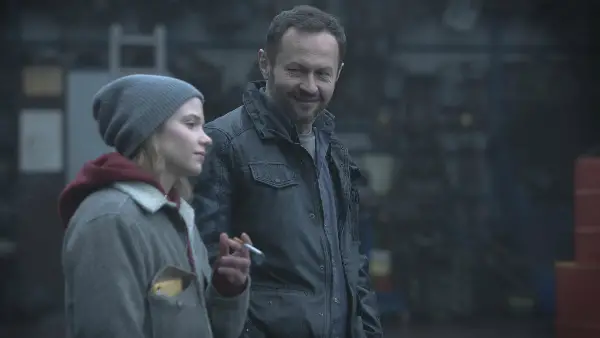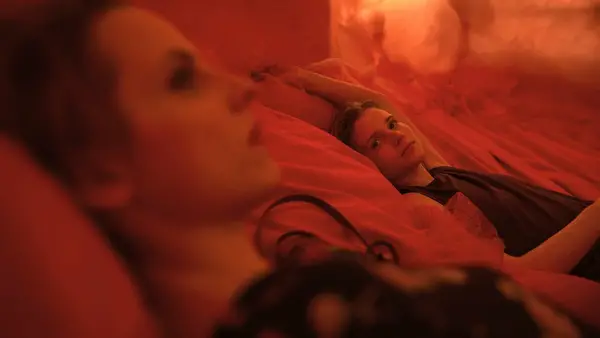NINA: Messy Yet Compelling Slice Of Polish Cinema

Becky spends her days working in TV and she spends…
Narratively, the beginning of Nina reads similarly to Tamara Jenkins‘ critical hit Private Life – a couple attempting to have a baby look for a surrogate and almost destroy their relationship doing so. Stylistically, and with a few more twists and turns than Jenkins films, Nina could not be more different.
Olga Chajdas’ film centers on Nina, a Polish woman approaching middle age who is desperate for a baby with husband Wotjeck. Nina (Julia Kijowska) meets Magda (Eliza Rycembel) after accidentally backing her car into Magda’s, and after the three of them get to know each other, Nina and Wotjeck (Andrzej Konopka) begin to form a plan. Young, beautiful and carefree, Magda could be the perfect surrogate for Nina and Wotjeck’s baby, but Nina begins to develop a different kind of attraction to Magda. With her marriage in turmoil, Nina begins to realise that she might not be the person she thought she was.
Class, Gender & Sexuality
There are several themes at play within Nina. The most prominent are ideas about class, gender and sexuality – all of which revolve around central character Nina. From the beginning of the film, Nina and Wotjeck’s relationship is interrogated – Wotjeck is a mechanic working in a local garage whereas Nina is a teacher and seemingly highly educated. The two of them clash often with the root issue seeming to be the wide berth between their classes and backgrounds. When Nina and Wotjeck invite Magda over for drinks early on in the film, Nina is seen constantly correcting Wotjck’s grammar – a sign that there are more than just surface level issues within their relationship.

Later on, there is friction between Nina’s family and Wotjeck – there’s an implication that Nina’s mother does not approve of Wotjeck and that her mother is the one paying for IVF treatment and is not keen to spend any more money on the two of them. Alongside the familial expectations that Nina fall pregnant – traditional gender roles are common in conservative Poland – Nina struggles to counter the class difference and gender based expectations. Pursuing a relationship with Magda, though Nina is seemingly shocked when she first learns of Magda’s sexuality, is an escape from this conservative lifestyle that Nina seems destined to live.
Though these themes are present, Nina is often heavy-handed in approaching them. There isn’t an awful lot of subtlety in the film which, at times, it could have benefited from. Wotjeck’s working class mechanic seems like a stock character, devoid of any real depth. Nina is far more layered, but it is still difficult to understand Nina’s motivations for most of the film. Though the story-line of Nina’s fertility is originally the driving force, this tapers off quite quickly and it’s not clear what is driving the narrative forward.
An Abundance of Chemistry
Rycembel’s playful demeanour and elfish looks as Magda make her the perfect object for Nina to fixate her obsession on. Ryecembel’s performance is nuanced – she is a wholly believable character outside of her interactions with Nina and Wotjeck. Director Chajdas could have made Magda into a more mysterious and less grounded character – an escape for Nina rather than a ‘real’ person – but it is to Nina’s advantage that she doesn’t.

Some of the best sequences in Nina occur around the halfway mark after a slow build up which takes it time getting to the crux of the film. Magda and Nina’s first sexual encounter is shot tastefully and sensitively and, unlike many lesbian sex scenes in cinema, is not cheapened. The adrenaline and chemistry from both parties is clear and the musical score helps to heighten the tension between them even further. Both Kijowska and Rycembal bring so much life to their characters individually, and when Magda and Nina are on-screen together, Nina really kicks into gear.
Chajdas and cinematographer Tomasz Naumiuk frame much of the film from behind windows, doors and panes of glass – giving a lot of the action a distorted feel. There is a sense of general confusion and of not being able to see the entire picture – reflecting Nina’s mind-set throughout the film. The camera, like Nina, is not thinking clearly and everything is clouded – including, perhaps, Nina’s judgement.
In the same vein, Nina is consistently lit in a very low key fashion – often characters are shrouded in darkness in the corner of poorly lit rooms. The effect is striking – the film is full of experiences that Nina probably wants to keep in the dark – but it’s also frustrating. As much as Nina, Wotjeck and Magda are unable to see their own paths ahead, it’s also difficult for the audience to actually see anything which kind of undermines any action taking place.
Nina: Conclusion
Nina certainly feels like a first feature. One of the stand-out motifs is the recurring smatterings of violin notes which create a sense of almost hysteria over a few key scenes within the film. It feels absurd, but really quite wonderful. Nina could have done with more moments like this. Time with Nina in her classroom, or focusing on Wotjeck’s father seem wasted when set against the rest of the film. The unnecessary scenes also add to the overall feeling that Nina is simply too long for the story it is trying to tell. At over two hours, it could certainly be more succinct. Nevertheless, dynamic turns from its two stars and an intriguing relationship make it a pleasant enough watch.
What did you think of Nina? Will it pave a way for LGBTQ films in Poland? Share your thoughts in the comments below.
Nina is out in UK cinemas from 25th January. Information on worldwide distribution will be available soon.
Does content like this matter to you?
Become a Member and support film journalism. Unlock access to all of Film Inquiry`s great articles. Join a community of like-minded readers who are passionate about cinema - get access to our private members Network, give back to independent filmmakers, and more.
Becky spends her days working in TV and she spends every other minute writing about cinema, TV & feminism. Based in London, she also likes drinking gin, re-watching 'The X Files' and writing about on-screen representation and all manner of things over at femphile.com












